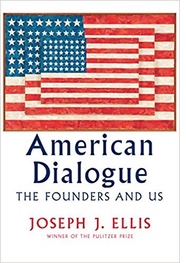Joseph Ellis has a new book out: "American Dialogue: The Founders and Us"
 An interview with Joseph Ellis.
An interview with Joseph Ellis.
Q: American Dialogue examines what George Washington, John Adams, James Madison and Thomas Jefferson might think about issues dividing the country today. Why did you address the present in this book?Q:
Joseph Ellis I began work on this book two years before Donald Trump was elected President. But the forces that produced Trump, our deeply divided society unsure of its future and deeply distrustful of government, were already visible.
Q: Do you feel like you have some answers now?
Historians are really great at predicting the past. But the future is for prophets, and the track record of most prophets is dismal. Globalization, the Internet, the sheer size of American society presents unprecedented problems. Until we recover some sense of the American dialogue–and we need to recover government as us rather than government as them–we’re going to be paralyzed in this second Gilded Age.
Will the “better angels of our nature” save us?
My view of history is that trusting in the better angels of our nature is a bad bet. The Founders didn’t believe in the better angels. They created a Constitution, which was designed to deal with imperfect human beings.
America has always had people who vehemently disagree. Are we that different now compared with in Jefferson’s time?
It’s a size problem. There’s a difference between 4 million people gathered on the Atlantic Coast and 325 million people across the nation. The single most important difference is that we are attempting to do something that nobody has ever done before: create a fully and genuinely multiracial society in a huge nation. ...